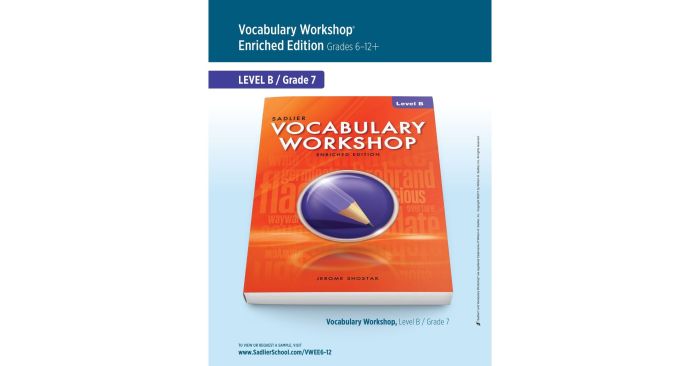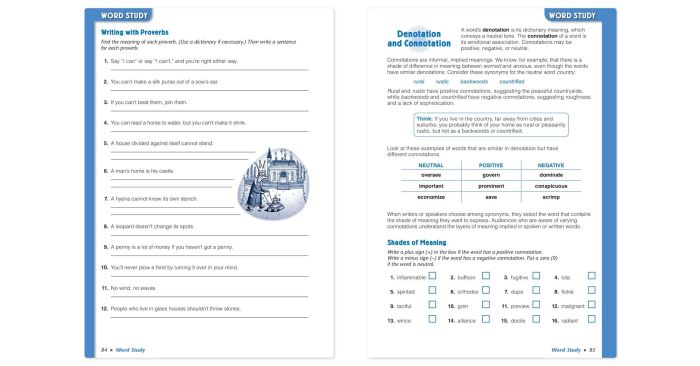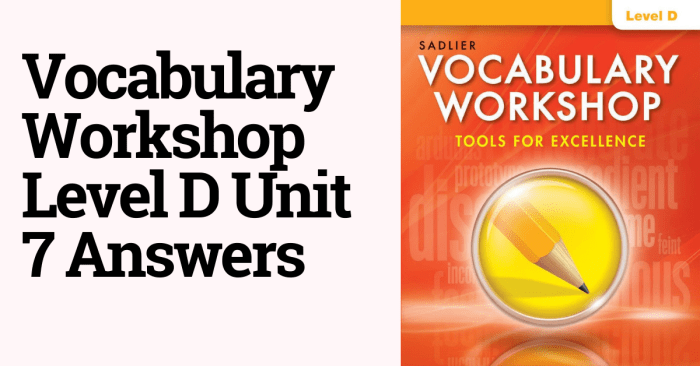Vocabulary Workshop Unit 10 Level D introduces learners to effective strategies for expanding their vocabulary and enhancing their communication skills. This comprehensive unit provides a solid foundation for building a robust vocabulary that is essential for academic success and effective communication.
Throughout this unit, learners will explore the concept of vocabulary, its importance, and the different types of vocabulary. They will engage in a variety of activities designed to improve their vocabulary skills, including reading, using flashcards, playing word games, and analyzing root words.
Vocabulary Introduction

Vocabulary refers to the set of words known and used by a person or group. It is an essential aspect of language that allows individuals to communicate effectively, express themselves clearly, and comprehend the world around them. Understanding vocabulary is fundamental for academic success, professional growth, and personal development.
Vocabulary can be classified into two primary types: receptive and expressive.
Receptive Vocabulary
Receptive vocabulary encompasses the words an individual can understand when they are spoken or written. It involves the ability to recognize and comprehend words through reading, listening, or observing. Receptive vocabulary is crucial for understanding conversations, reading texts, and interpreting information.
Expressive Vocabulary
Expressive vocabulary consists of the words an individual can produce when speaking or writing. It encompasses the ability to retrieve words from memory and use them effectively to express thoughts and ideas. Expressive vocabulary is essential for communication, storytelling, and written expression.
Examples of vocabulary words and their definitions include:
- Enigmatic(adjective): Mysterious or puzzling.
- Magnanimous(adjective): Generous or forgiving.
- Serendipity(noun): The occurrence of events by chance in a happy or beneficial way.
Vocabulary Building Strategies

Vocabulary building is essential for effective communication and comprehension. Various strategies can enhance vocabulary development, each with its unique benefits and implementation methods in the classroom.
Reading
Reading widely and consistently exposes learners to diverse vocabulary in context. Encouraging students to read books, articles, and other texts rich in vocabulary can significantly expand their word knowledge.
Flashcards
Flashcards are a classic vocabulary-building tool. Students create cards with new words on one side and definitions or examples on the other. Regular review and practice using flashcards helps reinforce and retain new vocabulary.
Word Games
Word games such as crosswords, Scrabble, and word puzzles provide an engaging and interactive way to build vocabulary. These games encourage students to think critically, expand their knowledge of synonyms and antonyms, and develop their spelling skills.
Vocabulary Activities

Vocabulary activities are essential for enhancing students’ vocabulary skills. They provide engaging and interactive ways to learn new words, improve comprehension, and expand expressive language. These activities can be tailored to different learning styles and levels, making them accessible to all students.
Word Puzzles
Word puzzles, such as crosswords, word searches, and anagrams, are fun and challenging ways to reinforce vocabulary. They require students to think critically, problem-solve, and use deductive reasoning to complete the puzzle. By actively manipulating words and letters, students strengthen their word recognition, spelling, and vocabulary knowledge.
- Crosswords:Provide a grid with empty squares and clues related to the target vocabulary words. Students fill in the squares with the correct words, using the clues to guide them.
- Word Searches:Hide the target vocabulary words within a grid of letters. Students search for and circle the words, improving their visual scanning and word recognition skills.
- Anagrams:Scramble the letters of a target word and provide it to students. They rearrange the letters to form the correct word, enhancing their letter manipulation and spelling abilities.
Vocabulary Charades
Vocabulary charades is a dynamic activity that combines physical movement with vocabulary learning. It encourages students to use their creativity, body language, and communication skills to convey the meaning of a word without speaking.
- Prepare Vocabulary Cards:Write down the target vocabulary words on separate cards.
- Divide Students into Teams:Form teams of 2-3 students.
- Take Turns Acting Out:One student from each team takes turns picking a card and acting out the word for their team to guess.
- Guessing and Scoring:The team has a limited time to guess the word. Correct guesses earn points for the team.
Root Word Analysis
Root word analysis involves breaking down words into their root words, prefixes, and suffixes. This activity helps students understand the etymology and structure of words, enabling them to derive meaning and expand their vocabulary. By studying root words, students can recognize patterns and relationships between words, enhancing their comprehension and spelling skills.
- Identify Root Words:Present students with a list of words and have them identify the root word of each.
- Prefixes and Suffixes:Discuss prefixes and suffixes and how they change the meaning of the root word.
- Word Building:Have students create new words by combining different root words, prefixes, and suffixes.
- Word Families:Group words that share the same root word into word families, demonstrating the relationships between words.
Vocabulary Assessment

Assessing vocabulary knowledge is crucial for evaluating students’ progress and understanding. Various methods can be employed, each with its advantages and disadvantages.
One common method is quizzes, which involve short tests that assess students’ knowledge of specific words or terms. Quizzes can be administered regularly to track progress and provide immediate feedback. However, they may be limited in scope and can only measure recognition or recall.
Writing Assignments, Vocabulary workshop unit 10 level d
Writing assignments, such as essays or reports, allow students to demonstrate their understanding of vocabulary in context. By using target vocabulary in their writing, students can show their ability to apply and integrate new words into their writing. However, grading writing assignments can be time-consuming, and it may be challenging to assess vocabulary knowledge separately from other writing skills.
Oral Presentations
Oral presentationsprovide students with an opportunity to practice using vocabulary in a spoken context. They can prepare speeches or presentations that incorporate target vocabulary, demonstrating their understanding and pronunciation. However, oral presentations can be challenging to assess objectively, and they may not be suitable for all students.
Tips for Effective Vocabulary Assessments
- Use a variety of assessment methods:Employing multiple methods provides a more comprehensive assessment of vocabulary knowledge.
- Align assessments with learning objectives:Ensure that assessments measure the specific vocabulary skills and knowledge being taught.
- Provide clear instructions:Students should understand the expectations and format of the assessment.
- Use authentic materials:Incorporate real-world texts or situations to make the assessment more meaningful.
- Provide feedback:Offer constructive feedback to students on their vocabulary usage, both correct and incorrect, to support their learning.
Vocabulary in Context: Vocabulary Workshop Unit 10 Level D
Vocabulary is not merely a list of words to memorize; it is a dynamic tool that helps us comprehend and express complex ideas. Using vocabulary in context is crucial for developing a deep understanding of words and their nuances.
Incorporating Vocabulary into Reading and Writing
Incorporating vocabulary into reading and writing activities enhances comprehension and strengthens vocabulary retention. When reading, actively seek out new words and pay attention to how they are used in sentences. This provides a rich context that aids in understanding the meaning and usage of the word.
Similarly, when writing, consciously incorporate new vocabulary to expand your vocabulary and improve your writing style.
Benefits of Using Context Clues
Context clues are invaluable aids in deciphering unfamiliar words. They provide hints and cues within the text that help readers infer the meaning of a word. Context clues can be syntactic (e.g., the word’s position in the sentence), semantic (e.g.,
synonyms or antonyms), or pragmatic (e.g., the overall topic or situation).
Using context clues not only enhances vocabulary but also improves reading comprehension and critical thinking skills. By actively engaging with the text and seeking clues, readers develop a deeper understanding of the author’s intent and the nuances of the language.
FAQ Overview
What is the importance of vocabulary?
Vocabulary is essential for effective communication, as it allows individuals to express their thoughts and ideas clearly and accurately. A strong vocabulary enhances comprehension, critical thinking, and problem-solving abilities.
How can I improve my vocabulary?
There are various strategies for improving vocabulary, including reading widely, using flashcards, playing word games, and analyzing root words. Engaging in these activities regularly can help expand vocabulary and improve communication skills.
How is vocabulary assessed?
Vocabulary assessment can be conducted through various methods, such as quizzes, writing assignments, and oral presentations. These assessments evaluate learners’ understanding of vocabulary words, their ability to use them in context, and their overall vocabulary development.